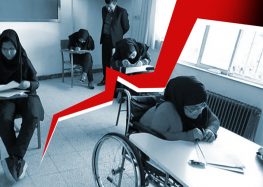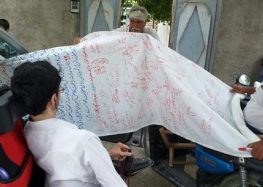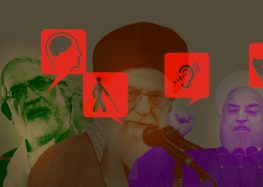Rouhani Cabinet’s Refusal to Allocate Funding for Disabilities Law Will Harm Millions
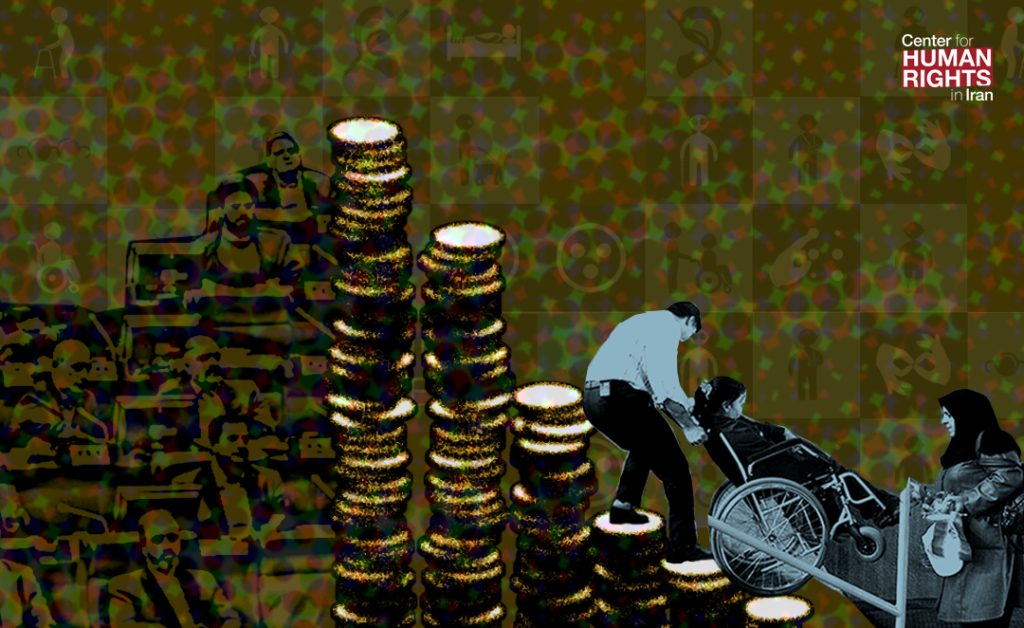
Law for the Protection of the Rights of Disabled Persons Requires Designated Funding
Current Budgetary Allocations Will Not Allow Implementation of Many Measures
December 1, 2018–Iran should fulfill its responsibility to fully implement its Law for the Protection of the Rights of Disabled Persons by specifically allocating the funds that are needed to enforce all its measures, the Center for Human Rights in Iran (CHRI) said in a statement today marking the International Day of Persons with Disabilities and the 10th anniversary of Iran’s ratification of the Convention on the Rights of Persons with Disabilities (CRPD).
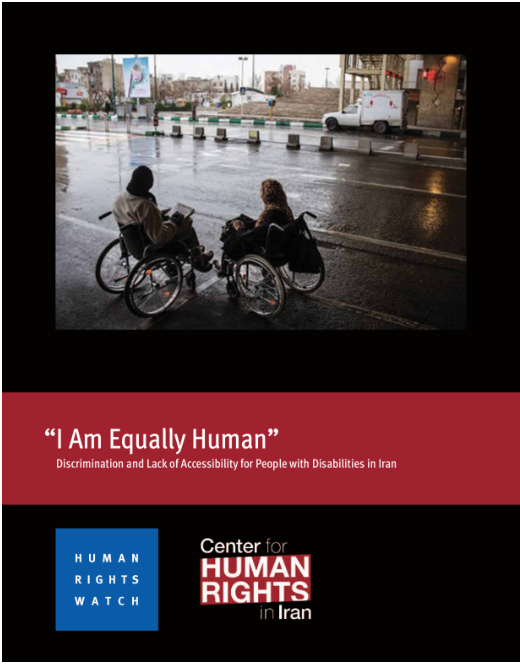
The 72-page report, “‘I Am Equally Human’: Discrimination and Lack of Accessibility for People with Disabilities in Iran,” documents the everyday barriers people with disabilities meet when going to government offices, healthcare centers, and when using public transportation.
The budget bill for the Iranian year ending in March 2020 is currently being discussed in the cabinet, and according to NGOs in Iran there has so far been no designated funds specifically allocated to implement the law. The vast majority of the law’s provisions cannot be implemented without these funds, and thus CHRI urges the authorities to make the budgetary allocations that the law in fact requires.
“The Iranian government is demonstrating indefensible indifference toward the lives of millions of human beings with disabilities. It must accept that passing laws and making speeches cannot replace action,” said Hadi Ghaemi, executive director of CHRI.
“Without full and exclusively designated budgetary funding, the Law for the Protection of the Rights of Disabled Persons will have little impact on the severe discrimination and obstacles the disabilities community faces in Iran,” Ghaemi said.
CHRI calls on the authorities in Iran to:
- Allocate sufficient and exclusive funds in next year’s national budget, independent from the State Welfare Organization’s (SWO) budget, to fully implement and enforce all measures contained in the Law for the Protection of the Rights of Disabled Persons.
- Engage and consult extensively with persons with disabilities and related civil society organizations regarding the policies and actions that are needed to effectively protect the rights of the disabilities community in Iran.
- Ensure that particularly in times of economic deterioration and/or crisis, all goods and services that are essential to marginalized sectors of society, including persons with disabilities, continue to be available and affordable.
Government Ignores Requirement of Designated Funds for Disabilities Law
As in previous years, the next budget will include funds for people with disabilities only under the umbrella of the SWO, even though Article 30 of the Law for the Protection of the Rights of Disabled Persons explicitly states that the Plan and Budget Organization (PBO) should set aside specific and exclusive funds for the enforcement of its provisions.
Without a sufficient and designated budget that is independent from the SWO, there will not be enough resources to fully implement and enforce the new disabilities law. Many of the specific provisions in the law will be impossible to realize, such as insurance coverage for needed medical and rehabilitation services, increasing the disability allowance to the level of the minimum wage, and the creation of a fund to support employment opportunities. As a result, millions of Iranians with disabilities will face serious obstacles in meeting their daily needs and gaining their most basic human rights, such as access to employment, education, healthcare and rehabilitation services.
Persons with Disabilities Face Discrimination and Obstacles in All Walks of Life
Persons with disabilities in Iran face a myriad of discriminatory policies and practices that prevent equal access to employment, education, public services and health and social services. For example:
- Inaccessible infrastructure, as well as discriminatory hiring practices, contribute to an unemployment rate among persons with disabilities that is five times higher than the national average.
- The monthly disability allowance of 160,000 tomans ($38 USD at the official exchange rate, but roughly $10 at current free market rates) is a sixth of the national minimum wage.
- Persons with disabilities lack insurance to cover the prohibitive costs of critically needed medical and rehabilitation services and equipment.
- Persons with disabilities face severe inaccessibility in the public sphere, including in government buildings, public education, health and social services, and public roads and transportation.
The approved Law for the Protection of the Rights of Disabled Persons came into full force in May 2018, too late to be included in the current year’s national budget, but the authorities pledged to include funds for its enforcement in the upcoming budget that is currently under discussion by the Cabinet (for the Persian year March 2019-March 2020). Yet according to disabilities advocates, the PBO has not allocated special funds for its implementation — even though such allocation is required under Article 30 of the law.
In September 2018 several organizations for the disabled wrote to the PBO Director Mohammad Bagher Nobakht calling for the allocation of funds for the implementation of the new disabilities law.
In November 2018, Health Minister Hassan Hashemi wrote to the PBO asking for the allocation of funds for the enforcement of the Law’s Article 6, one of the law’s important provisions, which states: “The Health Ministry is required to provide health insurance to persons with disabilities under the SWO in a manner that would cover their physical and psychological rehabilitation needs in addition to general medical services.”
Following reports that a separate budget had not been set aside for the implementation of the law, 50 Iranian NGOs that advocate for the rights of people with disabilities issued a statement in November 2018, expressing dismay at the PBO’s blatant lack of attention that would result in “burying the minimum demands of 1.5 million persons with disabilities and their families in the country.”
The signatories called for a review of the proposed budget allocations for next year and reserved “the right to hold nationwide protests” if the government failed to take heed.
“Failing to allocate funds for a law whose every provision is tied to the ordinary lives of people with disabilities sends a message to society as a whole that those with disabilities are lesser citizens who should wait in line for government handouts,” wrote Negin Hosseini, a prominent defender of the rights of people with disabilities on November 4, 2018.
She added: “It sends this message that you are free to treat individuals with disabilities in any way you wish and deny them employment, housing, family life, education and welfare, and ignore plans to improve public spaces for their benefit and basically overlook them as human beings.”
As in previous years, the PBO’s national budget bill currently under discussion in the cabinet foresees only a 12 percent increase in the SWO budget. Yet the country is facing wide-ranging economic challenges, including an annual inflation rate of 30 percent, according to the IMF.
The proposed increase in the SWO’s budget will thus not even meet this year’s funding allocation levels, much less be able to enforce the Law for the Protection of the Rights of Disabled Persons. For example, according to the law’s Article 27, the monthly stipend should increase seven-fold in order to meet minimum monetary needs.
In July 2018, the deputy director of the SWO’s rehabilitation services, Hossein Nahvinejad, noted the insufficient funds and said: “The stipend for persons with severe disabilities was recently increased 3.5 fold to about 150,000 tomans [sic] which is not in line with current living costs in the country and the inflation rate at all.”
Ten years have passed since Iran ratified the CRPD. Member states have a duty to comply with its commitments regarding economic and social rights and to allocate the necessary amount of funds to ensure the right to health (Article 25), employment (Article 27) and minimum living standards (Article 28).
“Iran’s law to protect the rights of the disabled will remain just a piece of paper if sufficient and separate funds are not allocated for its implementation,” said Ghaemi.

